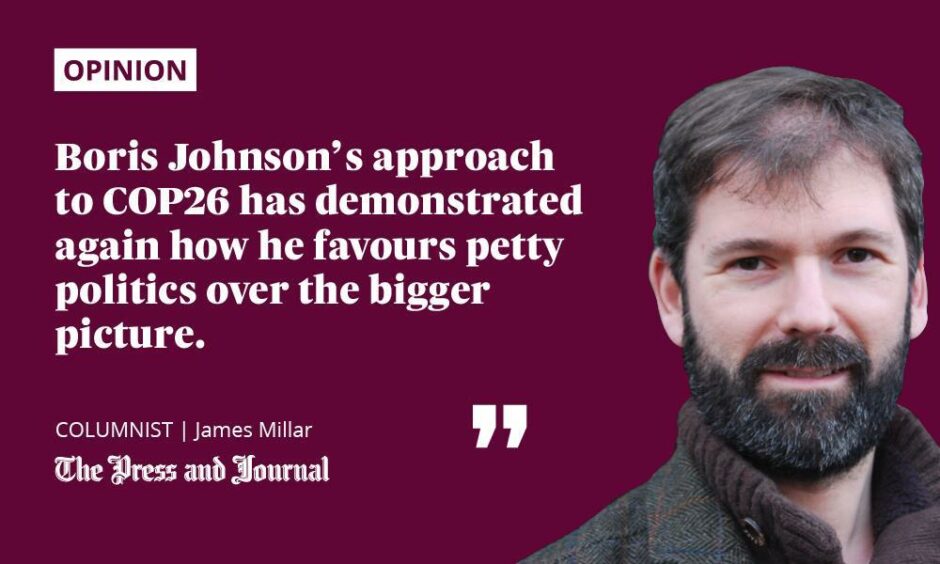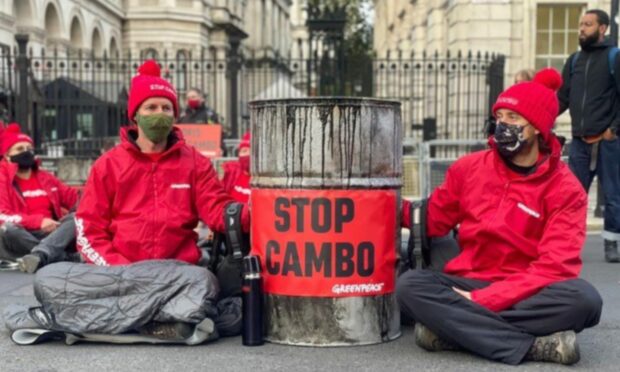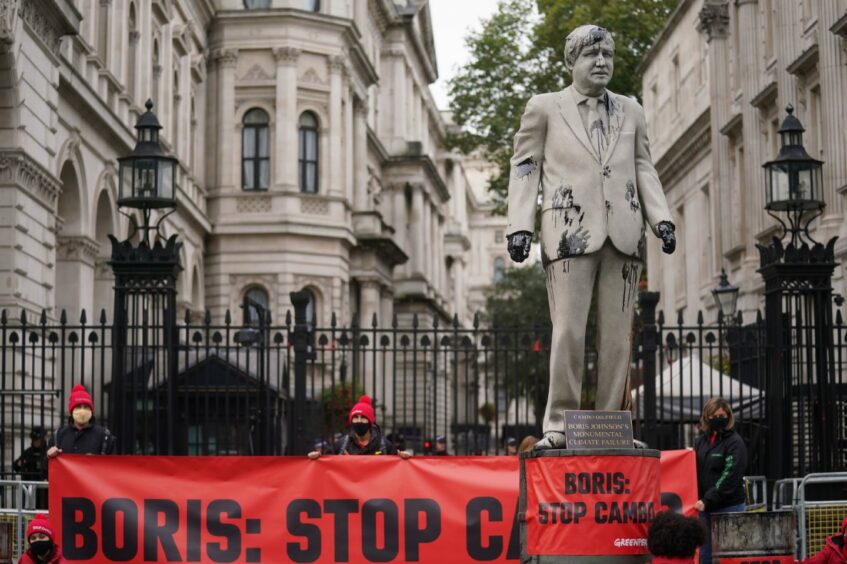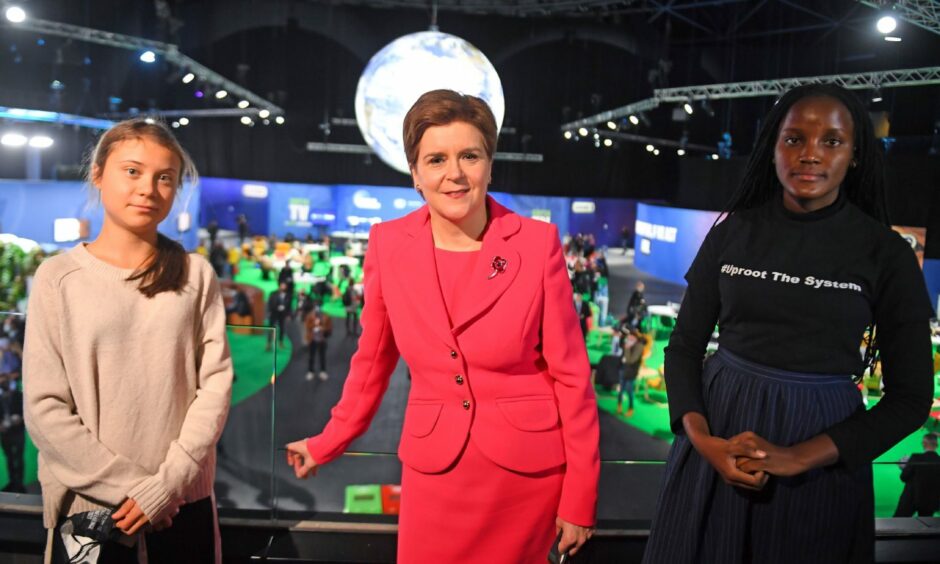Ask most in Westminster what Cambo is and you’re unlikely to get an accurate answer. Some might guess that it’s the name of one of London’s Michelin-starred restaurants struggling with the fallout from lockdown life.
Mention that it’s something to do with Scotland and some might assume it’s the nickname of whatever Scotland player rescued their team during yet another inexplicably harum scarum tie against one of the game’s titans, like Lichtenstein or the Faroe Islands.
Ask Foreign Secretary Liz Truss about Cambo, as Mishal Hussein did on Radio 4 as the COP26 climate conference opened on Monday, and she’ll start talking about India. Perhaps she thinks it’s an exotic cracker best paired with some curried spinach and a mango chutney.

Cambo is of course the name of the mooted oil field off the coast of Shetland that could yield hundreds of millions of barrels of oil, scores of quality jobs and a decent pay day for the Treasury in taxes.
Like the climate crisis, the Cambo issue is complicated
The controversy around Cambo exemplifies two key issues that handicap the UK government’s performance at COP26.
Firstly, like almost every aspect of the climate crisis, it’s complicated. Pointing out that the planet is warming and that we really ought to do something about it is simple. Solutions are much harder to come by.
And Boris Johnson’s administration is not one that trades in nuance. There’s a skill in boiling down politics to three-word slogans such as Get Brexit Done and Take Back Control that’s not to be sniffed at. Save the World is the obvious candidate at this juncture. But idioms are no substitute for intelligence. In the real world sustainable solutions require patience, strategy, vision and cooperation. Not words that readily attach themselves to the current Downing Street operation.
The other telling element of the Cambo debate is that it has demonstrated how poorly Scotland’s two governments work together. Responsibility for giving Cambo the thumbs up or thumbs down lies with Westminster. And the SNP are breathing a sigh of relief about that. No one in either London or Edinburgh wants to be accused of binning quality jobs in Scotland, or of favouring big business over the fate of humanity.
Secondly, Boris Johnson’s approach to COP26 has demonstrated again how he favours petty politics over the bigger picture.
Staging COP26 in Scotland
The Tories decided to stage the conference in Glasgow as a signal that they are dedicated to the union. For what says you love Scotland more than turning a bit of it into UN sovereign territory for a fortnight in November?
Yet, despite siting the conference in Scotland, the Tories have largely sought to shut the Scottish government out.
The truth is, whatever you may think of her politics, Nicola Sturgeon is a smart and serious politician. You might not want to sit next to her at a boozy awards dinner (trust me, been there done that, had to engage Michelle Mone in an Irn Bru drinking contest to relieve the boredom) but it’s hard to think of someone currently active in politics that you’d rather send in to a consequential climate negotiation.
Tony Blair might be the only other option, because he’s got the experience having gone off to Singapore in 2005 and returned with an unlikely win for London’s Olympic bid – a process not as serious as sorting the environment but regarded as such by the self-important guardians of the Olympic ideal. Blair was successful because he was fielding his strongest possible team, including David Beckham, and he put everything into it.
And that’s where we come back to the Tartan Army. My years of watching Scotland’s football team go back to the 1982 World Cup. And frankly nothing as good as Dave Narey’s toe poker against Brazil in that tournament has occurred since. However, for all the lack of talent and poor management witnessed in the years since, I can’t think of an occasion when a Scotland team hasn’t tried. And that’s what the fans respond to. The Tartan Army know that their team is sprinkled with diddies, donkeys and desperadoes. But they are genuine and committed.
Boris Johnson must be judged on his actions
Boris Johnson tried to sound like he was up to the moment when he opened COP26 on Monday and warned that the clock was at one minute to midnight. It was an improvement on his UN speech in September at which he invoked Kermit the Frog in his climate themed speech. Never mind the Rainbow Connection, that address suggested there was a loose connection somewhere in the PM’s wiring.
But away from his words Johnson must be judged on actions. He appointed Alok Sharma President of COP26 and has put time and effort into ensuring Nicola Sturgeon and the SNP can’t take any credit for the goings on in Glasgow. That has to beg questions about just how genuine he is about climate change.
And, he’s yet to rule on whether Cambo gets the green light or he bins it in the name of his green agenda.
James Millar is a political commentator and author and a former Westminster correspondent for The Sunday Post


